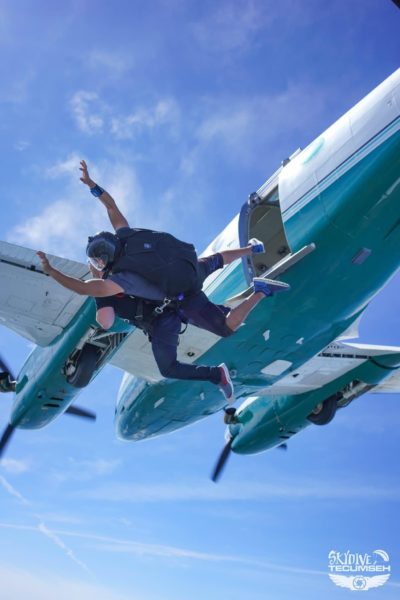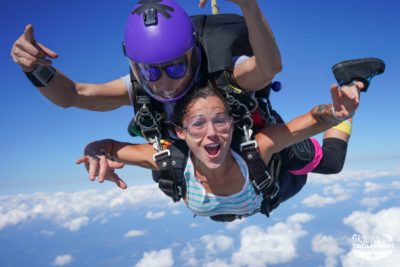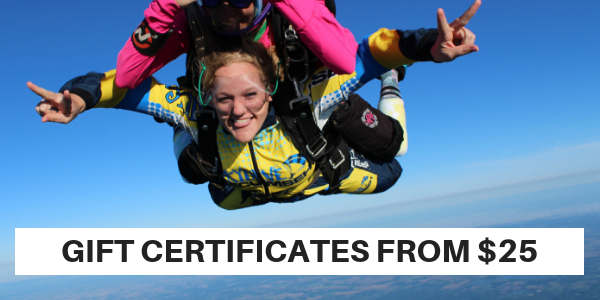- Michigan's Premier Skydiving Center
- Call Now: (517) 423-7720
Do You Have to Be in Shape to Skydive?
Monday, January 30, 2023
- Skydive Tecumseh
- 1/30/23
- 0
- Blog
Skydiving is technically considered an extreme sport rather than a passive roller coaster ride – even for a tandem skydive! But do you have to be in shape to skydive? Well, the answer isn’t as straightforward as a “yes” or a “no.” While it may not require a strenuous amount of physical exertion, there are some need-to-know physical requirements when making a skydive (whether you are a first-time skydiver or a solo skydiver).
Is Skydiving Physically Demanding?
 This answer is unique to the individual. Skydiving might not be as physically demanding to someone who lives an active lifestyle, as compared to someone who tends to be more sedentary. It is not required to be super physically fit to skydive, however, it tends to make things a bit easier when the time comes to perform physical movements during your skydive.
This answer is unique to the individual. Skydiving might not be as physically demanding to someone who lives an active lifestyle, as compared to someone who tends to be more sedentary. It is not required to be super physically fit to skydive, however, it tends to make things a bit easier when the time comes to perform physical movements during your skydive.
Most humans don’t fly, so when we’re in freefall we find that we’re using muscles that we wouldn’t normally utilize during daily activities. Not to mention, navigating on a smaller airplane might seem a bit awkward with all of the crouching, ducking, and kneeling, and requires a bit of agility to pull off.
It may come as a surprise when you learn that the landing portion tends to be the most physically demanding part of the skydive for most people. This is because of the physical requirements involved in the landing process.
Here, we’ll explain.
Skydiving Physical Requirements
Aircraft Agility
Boarding a skydiving airplane is nothing like boarding a commercial airplane. The space in the skydiving plane is minimal and sometimes comes equipped with a lovely bench seat. You’ll need to duck, crouch, and shimmy your way onto the airplane and on your way out of the airplane door.
As a tandem student, your instructor will attach themselves securely to your tandem harness while on the airplane. This means you’ll need to crouch and shuffle back to the open door while attached to your instructor – which can affect your balance and mobility. When it’s time to exit the aircraft, you’ll be required to kneel down at the door and get as close to the edge as possible. Aircraft etiquette requires quite a bit of agility and mental alertness in order to recognize when to move and how to move.
Body Flight Flexibility
During your ground training, your instructor will go over the proper body position during freefall. The arch position requires a bit of flexibility and may put some strain on your lower back. So if you have back issues, it’s important to communicate that with your instructor so they can find ways to ensure you’re comfortable during this time.
Leg Lifts on Landing
One of the most physically demanding tasks when performing a skydive is during the landing portion. Most tandem instructors will have the tandem passenger lift their legs so that they are parallel to the ground in order to slide on their bottoms when landing to avoid any injuries to their knees, feet, and ankles. This requires a bit of core strength. In somewhat rare cases, the instructor is able to land their passenger standing up (this will be determined by your instructor at the time of landing).
How to Physically Prepare for Skydiving
Eat a Nutritious and Balanced Meal
You should never skydive on an empty stomach, but you also don’t want to skydive on an overly full stomach. You’ll want to eat something light that will give your body the fuel to accommodate the flood of adrenaline and endorphins you’re about to experience.
Hydration, Hydration, Hydration!
 Staying hydrated helps keep your body alert and prepared. The only thing worse than skydiving dehydrated is skydiving with a hangover – so NO ALCOHOL! Trust us, skydiving hungover is the fastest way to ruin your skydiving experience.
Staying hydrated helps keep your body alert and prepared. The only thing worse than skydiving dehydrated is skydiving with a hangover – so NO ALCOHOL! Trust us, skydiving hungover is the fastest way to ruin your skydiving experience.
Good Rest
Your body is happiest and will perform better when it is well-rested and prepared to take on your next adventure!
Skydiving Exercises (optional)
Some strengthening exercises that will benefit your skydive are core and back strengthening exercises. If you’re feeling unsure about the arch body position, you can perform some superman stretches to prepare your body for your skydive.
Skydiving Height and Weight Restrictions
Along with an age requirement of 18 years old, there are certain physical restrictions to be considered when making a skydive. Height and weight restrictions vary from dropzone to dropzone. At Skydive Tecumseh, there is a maximum weight limit of 240 lbs. Weight restrictions are established by the manufacturer’s skydiving equipment weight restrictions. All guests will be weighed before jumping to ensure weight requirements are met. Guests should be height/weight proportional.
Skydiving With a Disability
There are skydivers the world over with various disabilities — having a disability does not necessarily preclude you from skydiving. It’s a case-by-case basis kind of situation. If you wish to skydive but are concerned about any physical limitations or abilities, get in touch with us to discuss your specific disability and how we might be able to accommodate you. We’ll also need to conduct an in-person evaluation to ensure you can safely make a skydive. Skydive Tecumseh has hosted many skydivers with various disabilities – so it is definitely not impossible!
Who Should Not Skydive
Skydiving and Pregnancy
For the sake of the parent and baby’s safety, skydiving while pregnant is discouraged. How about celebrating your darling bundle of joy after the stork has flown through with a special delivery?
Skydiving With a Cold
Skydiving with a head cold is not recommended and could potentially cause some serious damage to your ears and sinuses due to the pressure changes from altitude. Ouch. If you have the sniffles, you’ll want to reschedule.
Skydiving With a Heart Condition or Other Related Concerns
If you have any physical concerns regarding your health, we urge you to consult with your doctor before attempting a skydive. We know all about skydiving and next-to-nothing about medicine!
Have more questions or concerns? Contact a team member at Michigan’s most reputable skydiving center, Skydive Tecumseh! Blue skies, friends!

It was my first time skydiving and I was so impressed by the staff at Skydive Tecumseh! Everyone was friendly and professional making you feel comfortable from the minute you arrive. The experience was unexplainably awesome! The free fall was such a rush, the parachute release was much less of a jolt than I anticipated, the landing was super smooth and Ken Beach is the bomb! I will be back for my second jump soon.
Kendra Pifher Doriot
Copyright © 2025, Skydive Tecumseh, All Rights Reserved.
DropZone Web Design & Marketing by Beyond Marketing, LLC